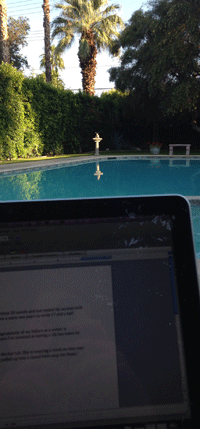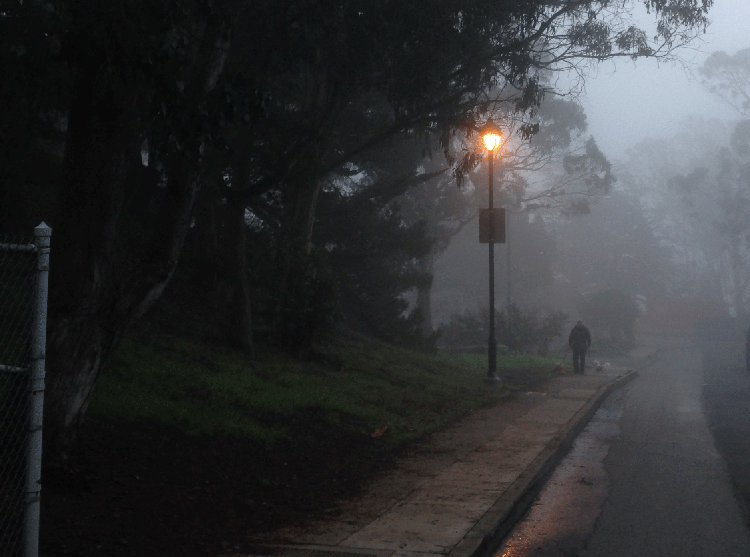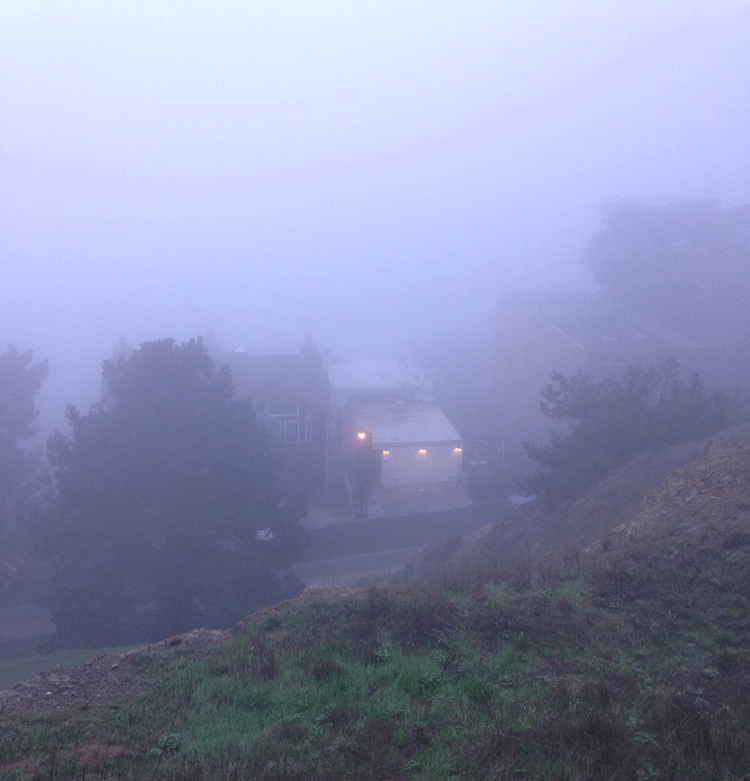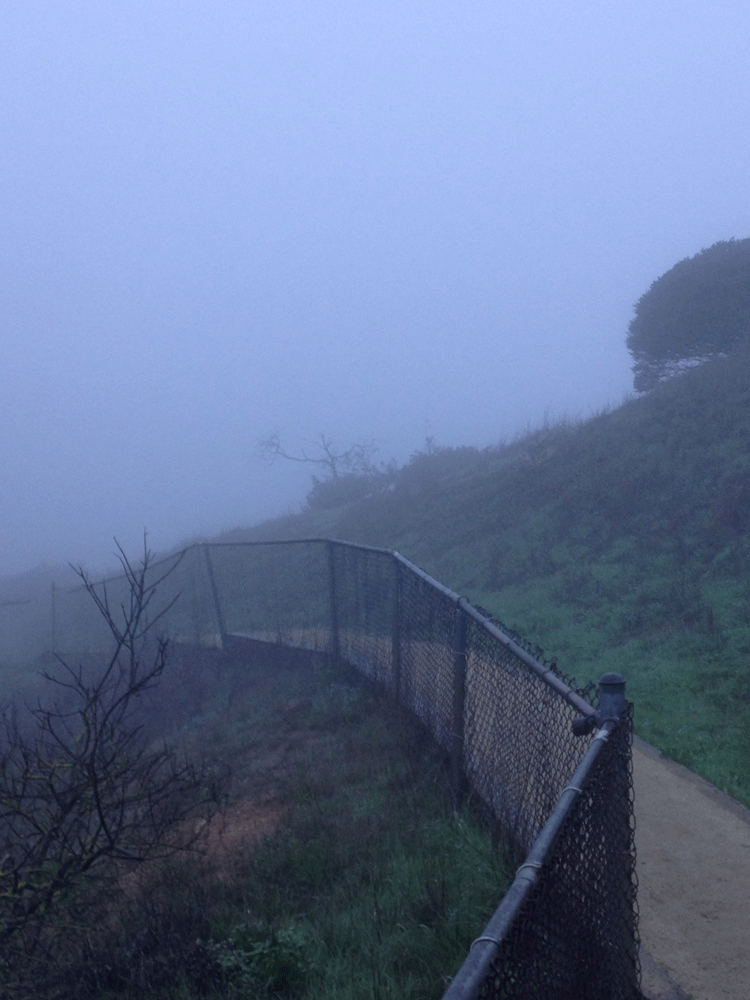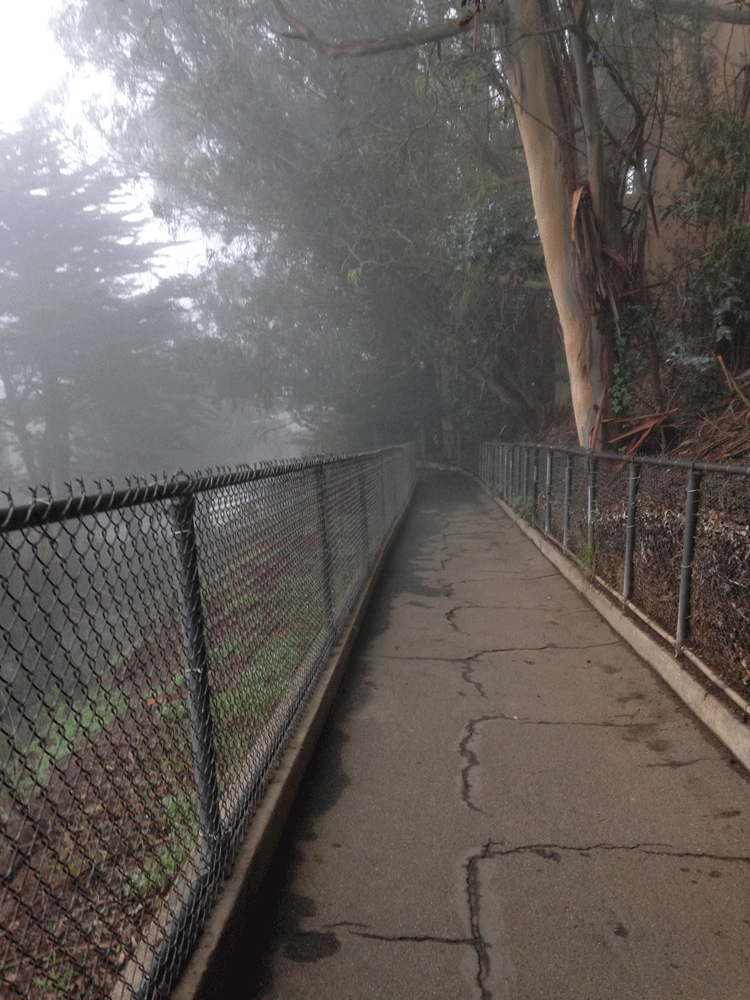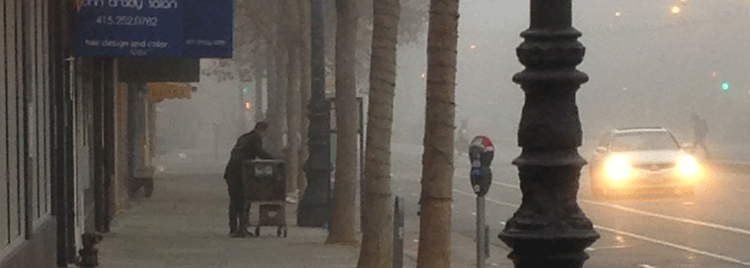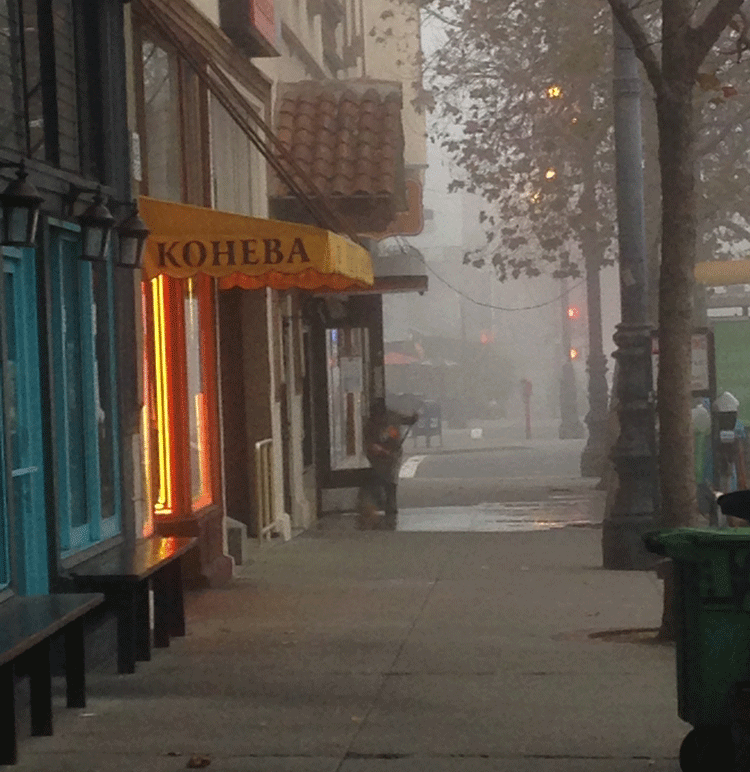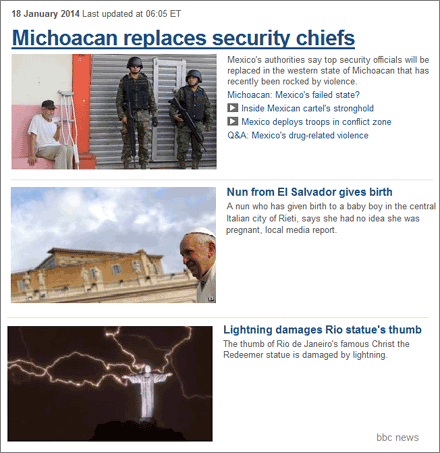Poem for Today
|
The Happiness Debate (NY Times) |
|
| A potent coffee roast and sunrise over the swimming pool.A sudden gripping fear: my life is fluff.
Venezuela they’re stripping protesters nude as a means of stripping their dignity Says one: our dignity is beneath our skin Witness: a photoshopped image of a young man bruised and beaten pulling back his pectoral skin to reveal the tricolor and estrellas of the Venezuelan flag. Me I make a living installing rich people’s software: Systems for startups Tools to manage the capture of the young leisure class throughout the world – a different sort of capture, though: data capture: young daredevils with time and money recording all the frivolities and athletic achievement that good fortune can by – Meanwhile on the other end of the spectrum:
Oh! but there goes the pretty boy with suburban tresses and expensive bike gear careening down a cliffside in Bolivia Ignorant of or inured to the strife in the streets below his ride He may see it; But this too shall pass. Meanwhile, — the one with golf courses and swimming pools and Canadians fleeing winter — I can barely keep my head aloft on the morning patio Can’t focus or pay attention Due to the weight There was a time when (Ginsberg x Thomas) Felt it But that was back in a different world: Different time.. Back before we learned to slum in fine hotels of which we were not guests; Back when words had constancy or at least a bit of meaning; Back before we learned to read with pictures; Back before life itself was some sort of ephemera that required mechanical intervention to experience it; Back before there were swimming pools. * * * |
What Suffering Does David Brooks, NY Times 4/7/2014The theologian Paul Tillich wrote that people who endure suffering are taken beneath the routines of life and find they are not who they believed themselves to be. The agony involved in, say, composing a great piece of music or the grief of having lost a loved one smashes through what they thought was the bottom floor of their personality, revealing an area below, and then it smashes through that floor revealing another area.Then, suffering gives people a more accurate sense of their own limitations, what they can control and cannot control.When people are thrust down into these deeper zones, they are forced to confront the fact they can’t determine what goes on there. Try as they might, they just can’t tell themselves to stop feeling pain, or to stop missing the one who has died or gone. And even when tranquillity begins to come back, or in those moments when grief eases, it is not clear where the relief comes from.The healing process, too, feels as though it’s part of some natural or divine process beyond individual control. People in this circumstance often have the sense that they are swept up in some larger providence. Abraham Lincoln suffered through the pain of conducting a civil war, and he came out of that with the Second Inaugural. He emerged with this sense that there were deep currents of agony and redemption sweeping not just through him but through the nation as a whole, and that he was just an instrument for transcendent tasks. It’s at this point that people in the midst of difficulty begin to feel a call. They are not masters of the situation, but neither are they helpless. They can’t determine the course of their pain, but they can participate in responding to it. They often feel an overwhelming moral responsibility to respond well to it. Excerpted from:
|
CATEGORY: The Novelist’s Due
On Sundays we walk in a circle
[An incidental homage to Daniel Alarcon’s “At Night We Walk in Circles” with indebtedness to “The Gift“, by Lewis Hyde.]
On Sundays we’ve taken to going for walks in the morning to get the blood flowing and perhaps, to put it one way, transition from the perennial work hangover that is Saturday into the downward work spiral known as Sunday.
Or said optimistically: To flush the beautiful lethargy of sleep from our systems. To stay connected to ourselves and this place. To shake the coma that is technology.
This morning, just at the beginning of dawn, a pink razor clamshell appeared in the sky. Far above bedroom windows across Potrero and the Bay, the sun struggled to rise from behind a nimbostratus veil. Other than the slow changing of the sky from a shade of charcoal to a shade of light grey, this faint rose-colored band was the only indicator that daylight was approaching.
We donned our tennis shoes and ventured out to seek the new day from atop Corona Heights, that Mars-like clump of rock and dirt that juts up into the City’s airspace like an alien child of Twin Peaks.
On the perimeter of the park three police cruisers sat parked outside a house, their flashing red lights casting echoing strobes into the mist. From the summit came the voices of young people, their pre-dawn gathering a likely after-party for their Saturday night.
The large field at the entrance to the park was muddy and wet. Its interior is covered in broken bark that the City puts there because the place will grow no grass; the mulch was lightly swimming this morning because of the recent rain. The eucalyptus that line the border along Randall Museum Road drop their leaves and seedlets with abandon, creating an additional soggy brine: one less road to follow.
We climbed two hundred feet from base of the park along an easy path that rings the hill and apexes just below the summit. Karl the Fog was sound asleep atop Corona Heights, crowning its peak with a heavy brume. As a result, the sunrise was illusory, the event itself elusive in the drench of fog.
“contending and reckoning”
The week began for me with an ill-timed trip to the airport on Monday evening. Rush hour. In the rain. Dark skies and slick, glistening streets choked with cars. It cast a sullen mood over the entire week: the barely moving red-tinted traffic served as visual metaphor for the lethargic flow of blood in my body; the horns and aggravation from poorly timed stoplights mimicked the discordant symphony of frustration in my brain.
The foul mood came on the heels of reading Daniel Alarcón’s “At Night We Walk in Circles” on the plane ride to and from Virginia, which is where we spent a fine Thanksgiving holiday. It overlapped with my reading of “The Gift”, by Lewis Hyde, a well-known book about creativity and the artist in the modern world.
The timing of this mood shift was ill-conceived although admittedly serendipitous. My foul mood arrived at the onset of the holidays, that transitional period between the fat binge of Thanksgiving and the glittery verve of Christmas when generally I’m at ease, easy-going…Lately, the pessimists have been doing a tiny dance upon my shoulders, whispering sadistic little ditties into my ear as if to thwart my attention. It’s perfect timing to call into question one’s true intentions.
The former of the two serendipitous book finds – Alarcón’s fine, fine, excellently crafted and linguistically tasty novel – was inspirational and entertaining. The latter – Lewis Hyde’s heavy handed yet revelatory delving into Walt Whitman as an artistic sage (a true democratic beacon of the creative gift) as part of his larger argument of art as a gift that is both intrinsic and must be shared if it is to thrive – was at first exhausting. Then, once I’d sat myself down to lunch and abandoned all the rest of life and gave myself permission to simply read, it left me nourished in the mind although feeling somewhat deficient in the heart.
“The gift is not used up in use”
A goal of walking on Sunday morning is to appease the angry demons, the likes of which roosted in my mood this past week; to help flush them out and diminish their influence. And to be honest, this mood business is all really the same old tired broken record: the quest for survival of the artist in a world of contradictory desires.
A seesaw in perpetual motion.
Yin choking Yang.
As Hyde rightly puts it, “the gift is not used up in use…It is the talent which is not in use that is lost or atrophies.” Furthermore, “Bestowal [of one’s gift] creates that empty place into which new energy may flow.” This is salient to remember for those of us who write for ourselves, who confront in some public forum, as Allen Ginsberg called it, “the muck of the mind.” We may desire a larger audience but we know that the writing doesn’t wait for the reader.
“I know that my body will decay.”
Whitman.
“No fixed identity can relax in the face of this knowledge.” – Hyde.
Hyde also talks about identity in “The Gift” – new identities coming to life as old one’s perish. The decay of Whitman’s leaves of grass is not a death. He solves the poetic calculus astutely: the decay is a renewal.
Mind you, all this talk of altruistic artistry is pleasant, and to couple it with the reading of a young writer whose gift has been bestowed in beautiful form is encouraging, but it’s been a little bit off-putting at this current juncture. When my bad mood lifts and my disappointment at the fallow returns of my artistic effort subsides, I’m sure I’ll cling to the sentiment as true. Perhaps I’ll even embrace it again, as I once used to.
Meantime, though, it seems to me – and the thought occurred to me as we wended our way down the hill towards the Castro for coffee – that perhaps I am undergoing an identity shift; maybe my current decaying frame of mind is akin to the falling of autumn leaves, my mood the changing of the seasons.
We’ve taken to going for walks on Sunday morning.
Yes, I know, I mentioned that.
What I didn’t realize until today is that we have an unwritten rule for our walks; it’s an intrinsic aspect of our nature perhaps. The rule is that we never backtrack on our way home. We always take a different route.
Said differently (and I’ll have to think about whether the metaphor fits): On Sundays, we walk in a circle.
Where a story comes from
People often ask where stories come from.
Sometimes they’re inspired by things like this:
You go to bed after a fourteen hour workday, wake on a Saturday morning with the clamor of trying to pay the rent brandishing weapons in your brain like vigilantes tearing through a town.
Pick up the phone to see what time it is: 6:30am. Meh. Too soon to get up. Check the news? Why not.
There’s no more guaranteed disastrous way to start the day than by checking the news. If you’re a glad dystopian the endlessly repeated news stories must be titillating in all their rich misery: only a few paragraphs of coverage, of course, maybe a decapitated corpse. A catchy headline that may not quite capture the scene.
This is the Twitter age. Short attention span. Life in 500 words. Pay no journalists. Don’t give me all the story. Give me a life for free that I can easily consume in bits. Famine: eek. Bloody revenge? quick, show me the Vine!
Once in a while, however, there’s a serendipitous bit of news. In today’s case a nun giving birth, not having realized she was pregnant. Simultaneously Christ is emanating electricity from his fingertips atop Corcovado. Bombs are blowing up in public places everywhere. Vigilantes in Mexico’s Michoacan state are fighting drug cartels who may or may not be funded by other drug cartels.
It’s the perfect naissance for a story, this fortuitous clustering of little headlines: a virgin birth from a nun at a time when the world is decaying into a pit of its own creation, electrifying Jesus. The mind spins a little. It reorients, like the earth wiggling on its axis. The torrent of work thoughts blows aside like clouds to yield to the fantasy, this seed of artistic creation.
The story begins like this: While the organism consumes itself, the 2nd Coming is being staged in a cloister in Rieti, a small Italian town.
Delicious.
Seeds need water and soil and, most of all, fertilizer.
Enter imagination: neural alchemy. Fertilizer from the brain.
(Spoiler alert: imagination is really nothing more than the letting go of restraint and listening to the voices inside of you. It’s a bit like the devil in The Exorcist — Regan, strapped to the bed, her bedroom now essentially a naked padded cell, is visited by the priest, and the devil says through the girl: “Father, unloose my straps.” Imagination is the unloosening of straps, and the artist is the possessed.)
You write a line and scratch it out:
“Fleeing the anarchy of drug-riddled Central America…”
Too predictable.
The brain free associates and peruses the landscape of possibility that underlies her story. One of the questions you have is: How could she not know she was pregnant?
The brain, a vast resource, recalls that it’s not so uncommon. Why, don’t you remember watching this for about 3 seconds once…?
More curiously is: By whom did the nun get pregnant? According to the brief story, the child was named Francis, after the new Argentinian Papa. In the image selected by BBC to accompany the story, Pope Francis has a curious grin (see above). Is this merely sly British humour or begruntled Protestant rumour?
It nags the storymaker: what was a nun from El Salvador doing in a small town in Italy? How did she make her way there? Of all the places in the world…
Electrical impulses surge:
“Sold into a nunnery by her starving parents…”
No, I don’t think it works like that.
Where a story goes…
That’s the difficult part.
All the seeds of creation don’t necessarily add up to a healthy yield. As Philip Roth once said, “Writing is frustration–it’s daily frustration, not to mention humiliation…You fail two-thirds of the time.”
Ideation is a breeze. It’s the followthrough where things get tricky.
Today’s moment of inspiration, it turns out, will go nowhere. The general concept will likely linger — the 2nd coming and the apocalypse — but the story of the nun herself will disappear. Probably it will fade away into neural dust — the excrement of an electrical collision. She will go on with her life in real time, raise her child, deal with the Church. I might one day write a story of Mary Magdalene that lies in slumber and draw from the remembered sensations of the nun’s story. I may even unwittingly evoke lightning shooting from the fingertips of Jesus above Rio in that one.
Not because I remembered it, but because it was there. Once.
And that leftover spark is really where stories come from.
(And this is where they reside: My current writing directory. Blurred of course. Much tidier than the boxes in the closet from the pre-computer days.)
